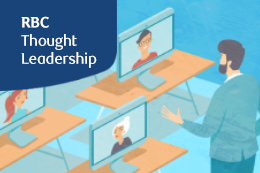Almost overnight, more than one billion students and nearly every school on the planet had to go online. In Canada, post-secondary institutions moved more than 2 million students online.
Many schools were caught off-guard and are struggling through this transition. A new RBC Thought Leadership report, The Future of Post-Secondary Education: On Campus Online and On Demand, found that Canadian institutions historically lacked the resources or expertise to fully develop online learning. In 2019, only about 16% of university and 12% of college students learned primarily online.
Other institutions have offered online education for years and are ready to seize this moment using the right tools, mindsets, and technologies.
John Baker is the founder of Waterloo-based D2L, a global software company that develops cloud-based learning management systems. He joined the RBC Disruptors podcast to talk about the mass disruption to education, what schools and institutions need to adapt, and how Canada can take advantage of this opportunity to lead the charge.
Listen on Apple Podcasts, Google Podcasts, Spotify or Simplecast |
See transcript
Baker noted that the schools now thriving in the pandemic are those that were ready for fully online learning, that invested in their faculty and online tools and concepts.
“It’s not just simply putting up videos or lectures or running a meeting. It’s really thinking about how to use that medium differently,” he said.
Crucially, it’s not about transplanting classroom methods onto a screen, but designing ways to engage students digitally. This has been a focus for Athabasca University, Canada’s largest online university, said its president Neil Fassina, who also joined the podcast.
“When online learning is designed specifically for the engagement, the interaction of an online learner, we can actually create a space that is incredibly personalized, incredibly engaging and doesn’t duplicate, but actually replaces what one might come to see in a place-based classroom,” Fassina said.
The next few months will be critical for institutions and classrooms – from kindergarten to post-grad – as they prepare for the return of school in the fall. The future of learning promises to be a hybrid, if not completely online, experience.
So, how should educators prepare for that future? Here are five takeaways.
1. Support teachers.Many are not yet equipped or supported for this brave new world. They need time to develop a whole new skill set, and have the tools to turn online teaching into something magical.
2. Personalize the student experience.
UX or user experience is key to all digital innovation. Online education isn’t about video lectures. It’s not Zoom. It’s about creating a unique interaction between teacher and student — and between students — and using feedback loops, including data, to constantly improve.
3. Go global.
There is a huge opportunity for Canada to leverage our strength in education and scale our digital platforms on a global basis. We need to think global campuses and global partnerships.
4. Think skills.
We’re shifting from a credential based to a skills based economy — and human skills are at their core. Coming out of the pandemic, one of those human skills — resilience — will be more valuable than ever. And students are developing resilience through online learning, along with collaboration, communication and complex problem solving.
5. Always on.
The future of education will be online, on campus and on demand. There are social aspects of a traditional educational environment that are still valued, and in demand. The institutions that will thrive will figure out how to blend technology and socialization – and involve students in the process.
Read our latest report on the future of higher education and Canada’s opportunity to become a global player in online education.

The Future of Post-Secondary Education
As Senior Vice-President, Office of the CEO, John advises the executive leadership on emerging trends in Canada’s economy, providing insights grounded in his travels across the country and around the world. His work focuses on technological change and innovation, examining how to successfully navigate the new economy so more people can thrive in the age of disruption. Prior to joining RBC, John spent nearly 25 years at the Globe and Mail, where he served as editor-in-chief, editor of Report on Business, and a foreign correspondent in New Delhi, India. Having interviewed a range of prominent world leaders and figures, including Vladimir Putin, Kofi Annan, and Benazir Bhutto, he possesses a deep understanding of national and international affairs. In the community, John serves as a Senior Fellow at the Munk School of Global Affairs, C.D. Howe Institute and is a member of the advisory council for both the Wilson Center’s Canada Institute and the Canadian International Council. John is the author of four books: Out of Poverty, Timbit Nation, and Mass Disruption: Thirty Years on the Front Lines of a Media Revolution and Planet Canada: How Our Expats Are Shaping the Future.
This article is intended as general information only and is not to be relied upon as constituting legal, financial or other professional advice. A professional advisor should be consulted regarding your specific situation. Information presented is believed to be factual and up-to-date but we do not guarantee its accuracy and it should not be regarded as a complete analysis of the subjects discussed. All expressions of opinion reflect the judgment of the authors as of the date of publication and are subject to change. No endorsement of any third parties or their advice, opinions, information, products or services is expressly given or implied by Royal Bank of Canada or any of its affiliates.





 Learn More
Learn More